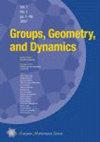可重整群的康托动力学
IF 0.8
3区 数学
Q3 MATHEMATICS
引用次数: 0
摘要
如果存在一个自嵌入的$\varphi \colon \Gamma \to \Gamma$,其像是有限索引的适当子群,则群$\Gamma$被称为“有限非共hopfian”或“可重整的”。这种适当的自嵌入被称为“$\Gamma$的重整化”。在这项工作中,我们将动力系统与$\Gamma$的重整化$\varphi$联系起来。关联康托动力系统的判别不变量${\mathcal D}_{\varphi}$是一个无限群,它是动力系统不对称性的度量。如果${\mathcal D}_{\varphi}$是某种重整化的有限群,我们证明$\Gamma/C_{\varphi}$实际上是幂零的,其中$C_{\varphi}$是动作图的核。我们引入了(虚拟)可重整康托动作的概念,并证明了与可重整群相关的动作是虚拟可重整的。研究了虚可重整康托作用的性质,证明了虚可重整是连续轨道等价的不变量。此外,可重整康托作用的判别不变量是连续轨道等价的不变量。最后,可重整康托动作的概念与根树的自同构的自复制群的概念相关。本文章由计算机程序翻译,如有差异,请以英文原文为准。
Cantor dynamics of renormalizable groups
A group $\Gamma$ is said to be “finitely non-co-Hopfian,” or “renormalizable,” if there exists a self-embedding $\varphi \colon \Gamma \to \Gamma$ whose image is a proper subgroup of finite index. Such a proper self-embedding is called a “renormalization for $\Gamma$.” In this work, we associate a dynamical system to a renormalization $\varphi$ of $\Gamma$. The discriminant invariant ${\mathcal D}_{\varphi}$ of the associated Cantor dynamical system is a profinite group which is a measure of the asymmetries of the dynamical system. If ${\mathcal D}_{\varphi}$ is a finite group for some renormalization, we show that $\Gamma/C_{\varphi}$ is virtually nilpotent, where $C_{\varphi}$ is the kernel of the action map. We introduce the notion of a (virtually) renormalizable Cantor action, and show that the action associated to a renormalizable group is virtually renormalizable. We study the properties of virtually renormalizable Cantor actions, and show that virtual renormalizability is an invariant of continuous orbit equivalence. Moreover, the discriminant invariant of a renormalizable Cantor action is an invariant of continuous orbit equivalence. Finally, the notion of a renormalizable Cantor action is related to the notion of a self-replicating group of automorphisms of a rooted tree.
求助全文
通过发布文献求助,成功后即可免费获取论文全文。
去求助
来源期刊
CiteScore
1.10
自引率
0.00%
发文量
45
审稿时长
>12 weeks
期刊介绍:
Groups, Geometry, and Dynamics is devoted to publication of research articles that focus on groups or group actions as well as articles in other areas of mathematics in which groups or group actions are used as a main tool. The journal covers all topics of modern group theory with preference given to geometric, asymptotic and combinatorial group theory, dynamics of group actions, probabilistic and analytical methods, interaction with ergodic theory and operator algebras, and other related fields.
Topics covered include:
geometric group theory;
asymptotic group theory;
combinatorial group theory;
probabilities on groups;
computational aspects and complexity;
harmonic and functional analysis on groups, free probability;
ergodic theory of group actions;
cohomology of groups and exotic cohomologies;
groups and low-dimensional topology;
group actions on trees, buildings, rooted trees.

 求助内容:
求助内容: 应助结果提醒方式:
应助结果提醒方式:


